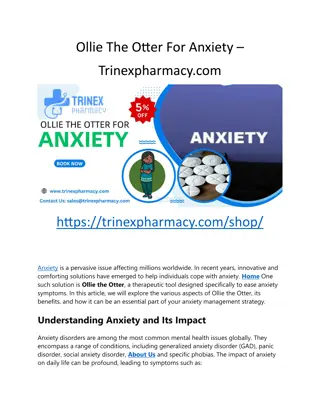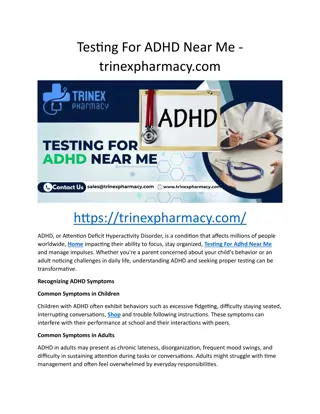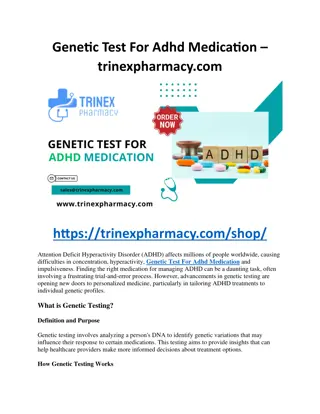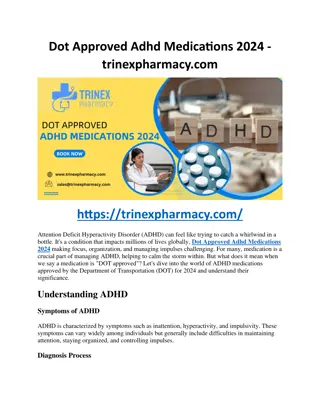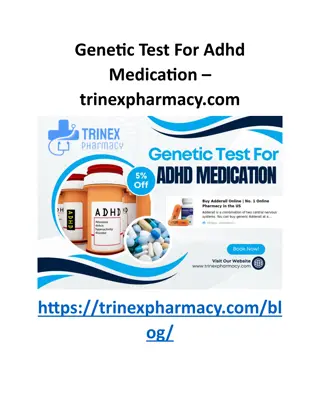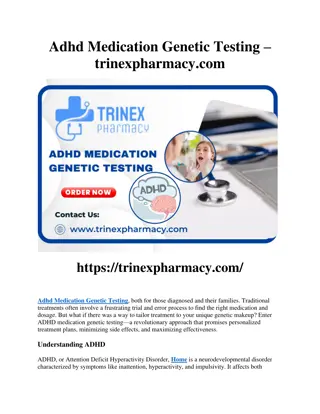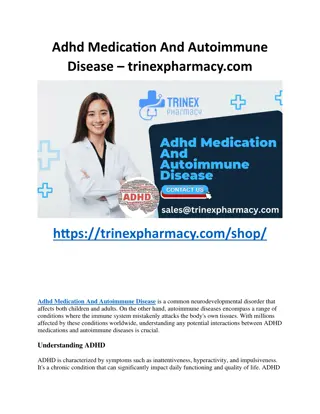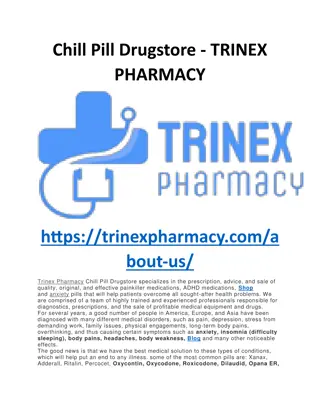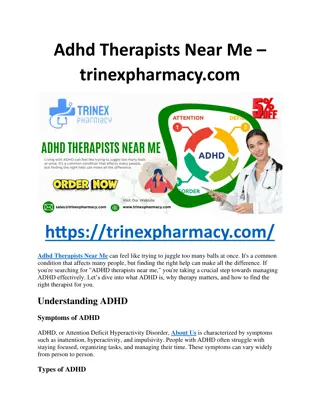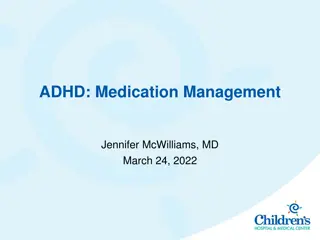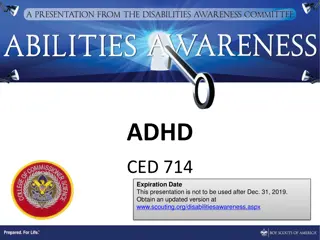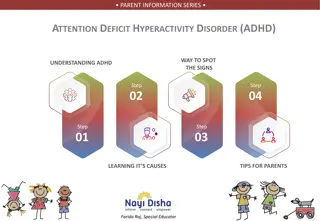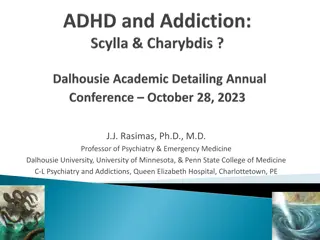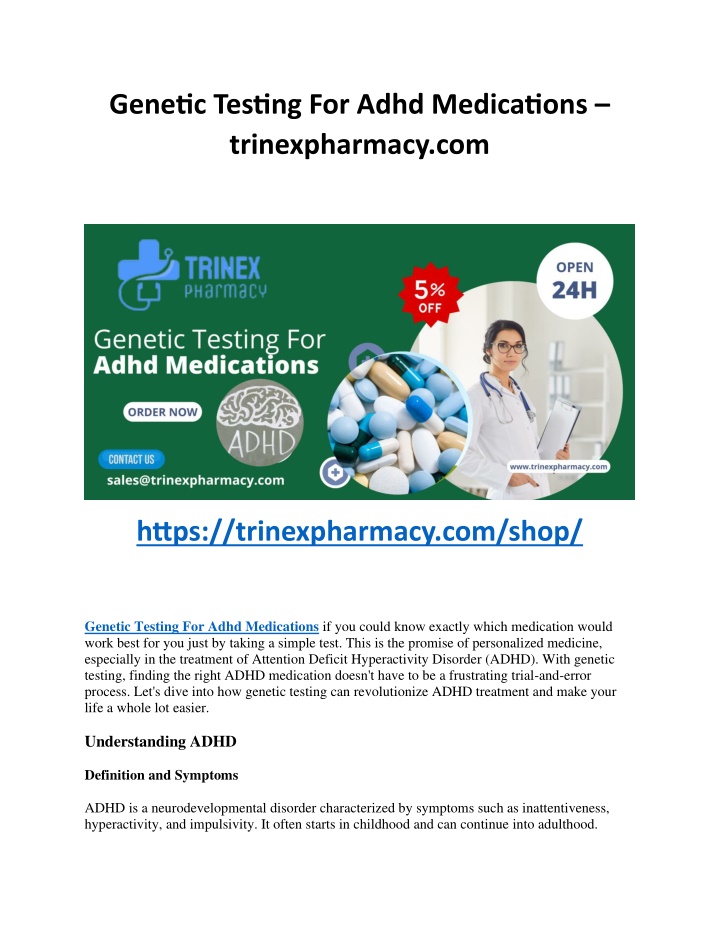
Genetic Testing for Adhd Medications - trinexpharmacy.com
Genetic Testing For Adhd Medications if you could know exactly which medication would work best for you just by taking a simple test. This is the promise of personalized medicine, especially in the treatment of Attention Deficit Hyperactivity Disorder (ADHD). Contact : 1 (747) 209 u2013 3649 E-mail : sales@trinexpharmacy.com
Download Presentation

Please find below an Image/Link to download the presentation.
The content on the website is provided AS IS for your information and personal use only. It may not be sold, licensed, or shared on other websites without obtaining consent from the author. If you encounter any issues during the download, it is possible that the publisher has removed the file from their server.
You are allowed to download the files provided on this website for personal or commercial use, subject to the condition that they are used lawfully. All files are the property of their respective owners.
The content on the website is provided AS IS for your information and personal use only. It may not be sold, licensed, or shared on other websites without obtaining consent from the author.
E N D
Presentation Transcript
Genetic Testing For Adhd Medications trinexpharmacy.com https://trinexpharmacy.com/shop/ Genetic Testing For Adhd Medications if you could know exactly which medication would work best for you just by taking a simple test. This is the promise of personalized medicine, especially in the treatment of Attention Deficit Hyperactivity Disorder (ADHD). With genetic testing, finding the right ADHD medication doesn't have to be a frustrating trial-and-error process. Let's dive into how genetic testing can revolutionize ADHD treatment and make your life a whole lot easier. Understanding ADHD Definition and Symptoms ADHD is a neurodevelopmental disorder characterized by symptoms such as inattentiveness, hyperactivity, and impulsivity. It often starts in childhood and can continue into adulthood.
People with ADHD may struggle with staying focused, following through on tasks, About Us and managing their impulses. Prevalence in Children and Adults ADHD affects approximately 5-10% of children and about 2.5% of adults worldwide. It's not just a "kids' disorder" many adults continue to experience significant symptoms that impact their daily lives and work. Current ADHD Medications Stimulant Medications The most common treatments for ADHD are stimulant medications such as Adderall (amphetamine) and Ritalin (methylphenidate). These drugs help increase attention and focus by boosting levels of certain neurotransmitters in the brain. Non-Stimulant Medications For those who do not respond well to stimulants or experience adverse effects, Refunds & Returns Policy non-stimulant medications like Strattera (atomoxetine) and Intuniv (guanfacine) can be prescribed. These medications also aim to improve attention and reduce hyperactivity. Common Side Effects Both stimulant and non-stimulant medications can have side effects, Blog ranging from insomnia and appetite loss to more serious issues like increased heart rate and mood swings. Finding the right medication with manageable side effects can be a daunting task. The Concept of Genetic Testing What is Genetic Testing? Genetic testing involves analyzing a person's DNA to identify specific genetic variants. These variants can influence how the body responds to medications, making it possible to predict which drugs will be most effective and cause the fewest side effects. How Genetic Testing Works A sample of saliva or blood is collected and sent to a lab, where scientists look for genetic markers related to drug metabolism and response. The results can provide insights into how your body processes certain medications. Genetic Testing in Medicine Historical Perspective
Genetic testing has been around for decades, initially used to identify inherited diseases. Over time, its applications have expanded to include pharmacogenomics the study of how genes affect a person s response to drugs. Applications in Various Medical Fields Genetic testing is now used in fields such as oncology, cardiology, and psychiatry to tailor treatments to individual patients. It s transforming medicine by moving away from a one-size- fits-all approach. How Genetic Testing Applies to ADHD Identifying Genetic Markers Researchers have identified several genes that influence how individuals respond to ADHD medications. By examining these genetic markers, doctors can predict which medications are likely to be most effective for a patient. Tailoring Medication Plans With genetic testing, doctors can create personalized medication plans that minimize side effects and maximize benefits. This approach not only improves treatment outcomes but also enhances the overall quality of life for patients. Benefits of Genetic Testing for ADHD Medications Increased Efficacy of Treatments Genetic testing can significantly increase the likelihood of finding an effective medication quickly. By understanding a patient s genetic makeup, doctors can prescribe drugs that are more likely to work from the start. Reduced Side Effects Knowing which medications a patient is less likely to tolerate helps avoid unnecessary side effects. This means a smoother treatment journey with fewer disruptions. Faster Time to Find the Right Medication The traditional trial-and-error approach to finding the right ADHD medication can take months or even years. Genetic testing can shorten this process, helping patients find relief faster. The Science Behind Genetic Testing for ADHD Genes Involved in ADHD
Several genes are associated with ADHD, including those involved in dopamine regulation (such as DRD4) and serotonin transport (such as SLC6A4). Variations in these genes can affect how patients respond to different medications. Role of Neurotransmitters Neurotransmitters like dopamine and norepinephrine play a crucial role in ADHD. Genetic testing can reveal how a patient's body processes these chemicals, guiding medication choices that optimize neurotransmitter levels. Pharmacogenomics Pharmacogenomics is the study of how genes affect a person's response to drugs. This field is essential in understanding the genetic basis for medication efficacy and side effects, particularly in ADHD treatment. Procedure for Genetic Testing How to Get Tested Getting tested is straightforward. You can request a genetic test through your healthcare provider, who will collect a saliva or blood sample and send it to a lab for analysis. Understanding the Results Once the results are in, your doctor will explain what the genetic markers mean for your treatment plan. This information can help you and your doctor make informed decisions about which medications to try. Case Studies and Research Success Stories Many patients have benefited from genetic testing, finding the right medication quickly and experiencing fewer side effects. Success stories highlight the potential for improved treatment outcomes and better quality of life. Ongoing Research Research in this field is ongoing, with scientists continuously discovering new genetic markers and improving testing methods. This means that genetic testing for ADHD medications will only get more accurate and helpful over time. Challenges and Limitations Ethical Concerns
Genetic testing raises ethical questions about privacy and the potential for genetic discrimination. It's important to have safeguards in place to protect patient information. Cost Considerations Genetic testing can be expensive, and not all insurance plans cover it. However, the long-term benefits often outweigh the initial cost, especially if it leads to effective treatment sooner. Accessibility Issues Access to genetic testing can be limited by geographical location and socioeconomic factors. Efforts are needed to make this technology available to all who can benefit from it. Future of Genetic Testing in ADHD Treatment Emerging Technologies New technologies are making genetic testing faster, cheaper, and more accurate. Advances in genomic sequencing and bioinformatics are paving the way for more personalized ADHD treatments. Potential Breakthroughs Future breakthroughs could include the identification of new genetic markers and the development of novel medications tailored to specific genetic profiles. The future of ADHD treatment looks promising with these advancements. How to Discuss Genetic Testing with Your Doctor Questions to Ask When considering genetic testing, ask your doctor about the benefits, risks, and costs. Discuss how the test results might impact your treatment plan and what steps to take based on the findings. Preparing for the Discussion Before your appointment, gather information about your family medical history and any previous experiences with ADHD medications. This will help your doctor understand your unique situation better. Patient Experiences Personal Stories
Hearing from other patients who have undergone genetic testing can provide valuable insights and encouragement. Many people report positive experiences and successful treatment outcomes after genetic testing. Community Support Joining support groups and online communities can offer additional support and information. Connecting with others who share similar experiences can be incredibly helpful. Conclusion Genetic testing for ADHD medications is a game-changer, offering a more personalized and effective approach to treatment. By understanding your unique genetic makeup, you and your doctor can find the right medication faster, with fewer side effects. If you or a loved one is struggling with ADHD, consider discussing genetic testing with your healthcare provider. It could be the key to unlocking a more effective and personalized treatment plan. FAQs How accurate is genetic testing for ADHD medications? Genetic testing is highly accurate in identifying genetic markers that influence medication response, though it's not foolproof. It provides valuable insights that can significantly improve treatment outcomes. Is genetic testing covered by insurance? Coverage for genetic testing varies by insurance provider and policy. It's best to check with your insurance company to understand your coverage options. How long does it take to get results? Typically, genetic test results take a few weeks to be processed and returned. Your healthcare provider will inform you of the exact timeline. Can genetic testing be done at any age? Yes, genetic testing can be done at any age. Both children and adults can benefit from the insights provided by genetic testing. What should I do if my genetic test suggests a different medication? If your genetic test suggests a different medication, discuss the findings with your doctor. They can help you understand the results and adjust your treatment plan accordingly.
Contact : +1 (747) 209 3649 E-mail : sales@trinexpharmacy.com



